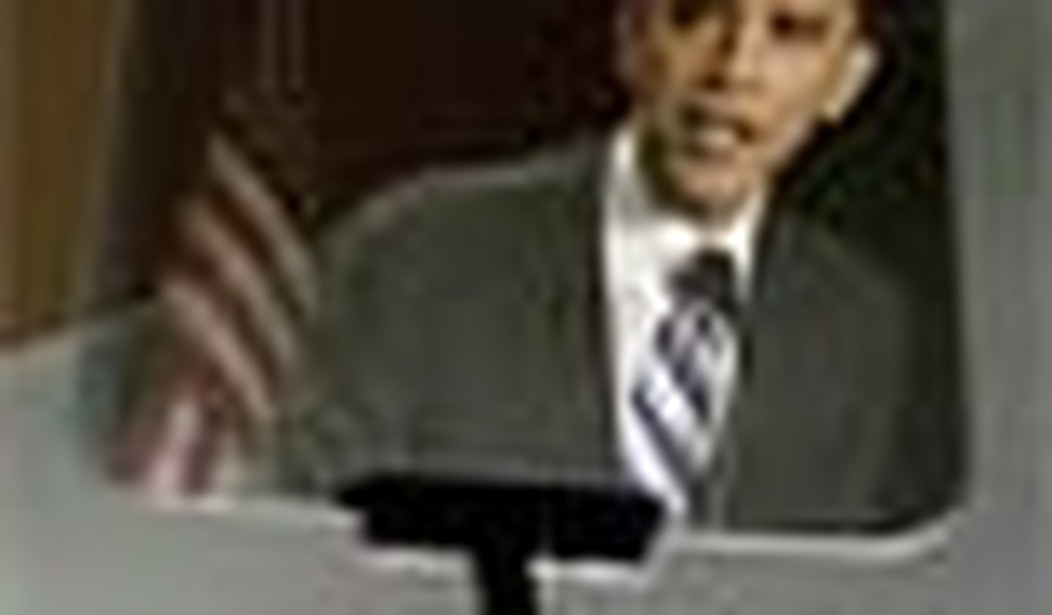As a high school teacher, I’m always mildly surprised to discover that my students have no real idea that foreign cultures — other peoples — are so different as to be virtually different species. They’re amazed to learn that untold millions of human beings have never seen a roll of toilet paper, and are dumbstruck to discover that in many nations, women and girls may be killed by their relatives for real or imagined offenses against family honor. Over the years I’ve learned that most American adults know, intellectually, that the peoples of other lands are not like Americans, but their practical understanding of these differences is, like their younger countrymen, weak. Unfortunately, the president of the United States is no better off. Arguably, he is worse.
Hillary Clinton was more prophetic than we imagined. That 3 a.m. phone call has happened again. Perhaps the administration’s first 3 a.m. call came in June of 2009, when the Iranian people rose against their theocratic oppressors. Mr. Obama took bold, decisive action, just as he has done with the crisis in Egypt. Here, from the White House website, is what Mr. Obama said on June 20, 2009:
The Iranian government must understand that the world is watching. We mourn each and every innocent life that is lost. We call on the Iranian government to stop all violent and unjust actions against its own people. The universal rights to assembly and free speech must be respected, and the United States stands with all who seek to exercise those rights.
As I said in Cairo, suppressing ideas never succeeds in making them go away. The Iranian people will ultimately judge the actions of their own government. If the Iranian government seeks the respect of the international community, it must respect the dignity of its own people and govern through consent, not coercion.
Martin Luther King once said “the arc of the moral universe is long, but it bends toward justice.” I believe that. The international community believes that. And right now, we are bearing witness to the Iranian peoples’ belief in that truth, and we will continue to bear witness.
It takes but a moment’s comparison of this rhetoric with that which Mr. Obama and Mrs. Clinton are currently employing on Egypt to understand that it is virtually identical. Mr. Obama is forthright and mighty in “watching,” mourning the loss of innocent lives, decrying violence and injustice, and supporting the “universal rights to assembly and free speech.” He is even more intimidating in “bearing witness.” And bear witness he did, as many were imprisoned, tortured and murdered, and the uprising that might have transformed Iran in favor of greater liberty and democracy was crushed.
There are, without question, differences in the Iranian and Egyptian uprisings. The Iranians are the youngest, most educated, and most pro-American people in the region. Overwhelmingly, they are anxious to depose the inhuman Muslim theocrats who have tortured and murdered them for decades. Almost certainly their success would have been America’s success, an enormous stride toward all of the high values touted in Mr. Obama’s rhetoric. It would have helped to establish real, as opposed to rhetorical, peace in the region. Mr. Obama, like the Palestinians he reflexively supports, seems to miss no opportunity to miss an opportunity — or to insult an ally, or support an enemy.
Egypt, on the other hand, is far more complicated. Hosni Mubarak, while generally supportive of America and American interests, was clearly a dictator, though not nearly as despotic as Saddam Hussein, and a ruler who kept one of the most virulent strains of Islam, led by the Muslim Brotherhood, under control. Because the CIA has never fully recovered from the Clintonian purge of human assets and capabilities, we were blindsided by the uprising and President Mubarak’s swift resignation. CIA Director Leon Panetta admitted that the information he provided at the House Intelligence Committee was not a product of professional skulduggery and analysis but of the lamestream media. Mr. Panetta served merely as a relay or conduit between the media and Congress. Is it any surprise that the CIA has no real idea who is behind the uprising or what their ultimate goals are?
With the Egyptian army in control, Egypt is momentarily stable, but few of the likely outcomes look promising — for America, for Israel, for peace, or for regional stability and Western civilization.
Egypt is the birthplace and intellectual and spiritual center of the contemporary world jihadist movement. The Muslim Brotherhood is arguably its vessel. If not directly behind the conflict, the Brotherhood is surely maneuvering behind the scenes with an eye toward taking control. We know that operatives of all of the primary state sponsors of terror and of the terror organizations themselves are streaming into Egypt, jockeying for power and influence. Even if one makes the naive, nuanced assumption that the uprising is an entirely spontaneous demonstration of youth power — without the influence of outside or jihadist agitation — the goal is surely not an American-friendly democracy. Recent polls have indicated an overwhelming preference for Sharia and all that goes with it. Fact: Sharia is not compatible — at all — with liberty, “universal rights,” or democracy. Once established, however, it will provide Mr. Obama with yet another opportunity to “bear witness” to the barbaric mistreatment of an entire nation.
Who, then, is picking up the phone at 3 a.m.? Considering all of the powerful, awe-inspiring foreign policy tools in the toolbox of the president of the United States — even now, we have substantial influence and persuasive power — which will he be most likely to employ? Our president is Barack Obama, and the tool to which he resorts, first, last, and always, is rhetoric.
Like my students, Mr. Obama, despite being always the smartest man in the room (according to his advisor and primary worshipper, Valerie Jarrett), eternally bored with offices far below his infinite intellectual capacities (apparently all to which he has ascended to date), knows little of the cultures of others. Ironically, we have a Department of State which is supposed to be staffed with people who know such things, but considering how often Mr. Obama has egregiously insulted the British, the State Department seems to know little about them. That being the case, there is probably no real hope that they know anything about the Egyptians — or that Mr. Obama will listen to them if they do. Which is worse? Discuss.
And so Mr. Obama resorts to rhetoric, but not the rhetoric of the wise, cautious statesman, careful with every word, lest unintended, potentially destructive messages be received. It is the rhetoric of the community organizer, the union boss, the black liberation theologian, the socialist, the man who, when his policies are rejected by the American people, thinks it’s a failure of “messaging,” a failure to be set right by yet another speech with a new “message” — a new word to replace a word to which the public has caught on. The American public, he understands, has not heard nearly enough of his speeches.
Thus has lunatic, ruinous borrowing and spending changed from “stimulus” to “investment.” Thus has a continuing and deep recession, a recession threatening to experience a double dip, had its back broken by a “recovery summer” (that wasn’t). Thus has spending the nation into bankruptcy at warp speed become “winning the future.” And thus has the long past due necessity of dramatically reducing spending — I mean “investment” — and revamping entitlements become the biggest, most destructive entitlement of all time — ObamaCare — and so have we set the goals of high-speed rail, of sending everyone to college (regardless of whether they want or need college), of “clean energy,” etc.
Mr. Obama appears incapable of understanding that rhetoric has its limits, particularly cross-cultural limits. His rhetoric is currently ineffective or annoying to a majority of the American public. Peoples who are struggling for mere individual and familial survival, or who would prefer that America and all Americans be obliterated — especially those who are willing to take affirmative steps toward that goal — are likewise unaffected by Mr. Obama’s particular brand of persuasion, except to more firmly entrench their enmity. Being liked by the “Arab street” or the “Muslim street” is meaningless in the affairs of nations. Being respected or feared, and being able to influence events toward freedom, democracy, and peace, is. Mr. Obama seems consistently to place a higher priority — much higher — on the former.
Mr. Obama’s Olympian narcissism is likewise an impediment to a competent foreign policy. This was clearly illustrated by what he doubtless imagined to be his historic address to the Muslim world in Cairo on June 4, 2009. What could he have been thinking? “I shall sojourn to the land of Egypt. There shall my word be made manifest unto the Muslims, and they shall hear, find it good, and like me, and bask in my glory.” Not so much. In fact, the results were almost certainly even less effective than his historic address to the Germans on July 24, 2008, delivered when he was only the most leftist member of the U.S. Senate, at least in part because this time no one served beer. Yet the media — like CNN’s Wolf Blitzer — wonders if this momentous speech was the proximate cause of Mr. Mubarak’s removal.
American leftists are often content when Mr. Obama must rhetorically wander off the reservation. They know that he is winking at them and that his wink is saying: “I have to make this pretense, but I’m really one of you.” Unfortunately, Mr. Obama seems to be winking at the Muslim world. There are fundamental cultural differences — to which Mr. Obama is apparently oblivious — that prevent observant Muslims from understanding his many rhetorical winks, or from accepting them at face value, or at all.
Consider the outrage that would ensue should an American president journey to Rome to address the Catholic world, or to Salt Lake City to proclaim historic outreach to the Mormon world. Imagine NASA’s administrator announcing that he has received a new primary mission from the president, which is to make Hindus feel good about the scientific contributions of their ancient ancestors. Yet Mr. Obama can make such blatant winks at Muslims and none dare question it. But the larger question is whether his “outreach” is effective, or — because of who he is — harmful.
Put aside the fact that the cultural gulf will render virtually anything Mr. Obama says meaningless to the Muslim world — with a few exceptions that will be explored shortly. Mr. Obama has two much larger problems, problems that render his influence on Muslims virtually non-existent. As POTUS, Mr. Obama is the leader of the “Great Satan,” the force tens of millions of Muslims see as the greatest worldly evil opposing the very existence of Islam. No amount of outreach or soaring rhetoric will address this. The other, and larger, problem is Mr. Obama’s heritage.
In response to public concerns that he is Muslim, Mr. Obama has professed his Christianity. Most Americans are willing to accept such professions, but some still believe him to be a Muslim, based at least in part on his obvious partiality to Muslims and Muslim causes. There is no doubt that Mr. Obama was born to a Muslim father, and during his childhood, raised as a Muslim in a Muslim nation. To observant Muslims, the child of a Muslim father is a Muslim. Unlike Christians, who may leave a given faith and adopt another — or none at all — with few or no consequences, Islam is not so forgiving. A Muslim who leaves the faith is an apostate fit for death. Most Muslims will not try to kill those who leave their faith, but a great many will. To any truly observant Muslim, by his own public admission, Mr. Obama is an apostate Muslim. Combine this with his position as the leader of the Great Satan, and Mr. Obama may very well be the last person on Earth to which an observant Muslim will listen, to say nothing of their willingness to act upon his rhetoric.
So where does this leave America? To the degree that Mr. Obama’s primary foreign policy tactic is rhetorical, he will be seen by much, perhaps most, of the Muslim world as weak and worthy of ridicule, particularly among those who wish us ill. It is weakness, more than anything else (particularly Gitmo), which serves as a jihadist recruitment tool. At the same time, his neophyte knee-jerk proclamations during crises may serve to convince those who are our allies, or who might be considering the wisdom of greater cooperation with America, that the most dangerous ally in the Middle East is America — an axiom with a long and venerable history in the region.
The situation in Egypt may eventually resolve in a manner that is, at least, not overtly destructive to American and Israeli interests, which are the interests of peace and regional stability. But if this happy state of affairs does occur, there is little information currently available to suggest that Mr. Obama will have had anything to do with it other than to try to talk it into submission.
Surely, if things turn out well, he will take credit, as his supporters and the media (but I repeat myself) have already begun to do. For the moment, however, with the outcome still uncertain, Mr. Obama is being uncharacteristically quiet — aside from the typical Kumbaya rhetoric about the march of history.
Americans — and untold millions around the world — may wish that when the phone rang at 3 a.m., Mr. Obama would have rolled over and gone back to asleep.









Join the conversation as a VIP Member